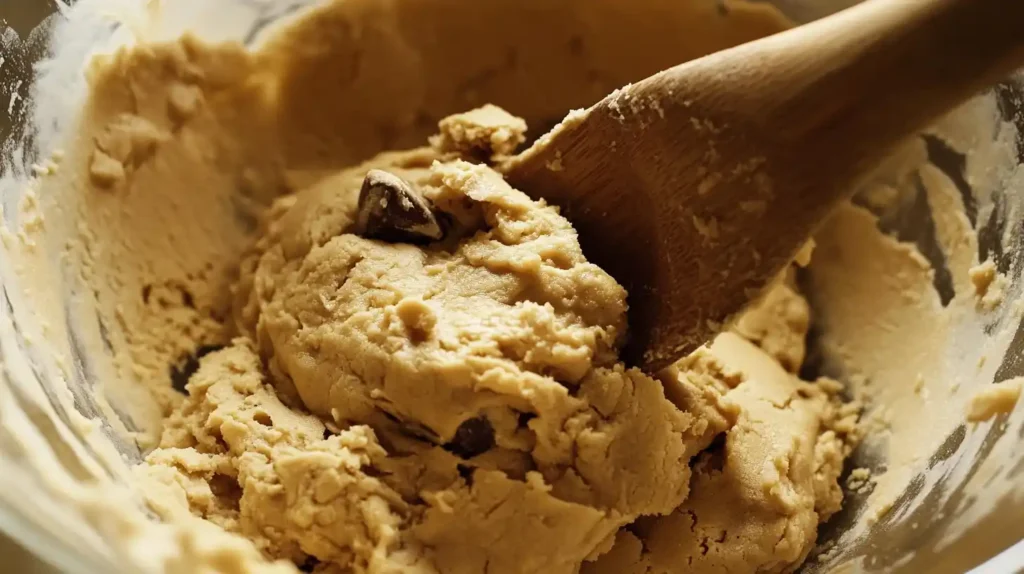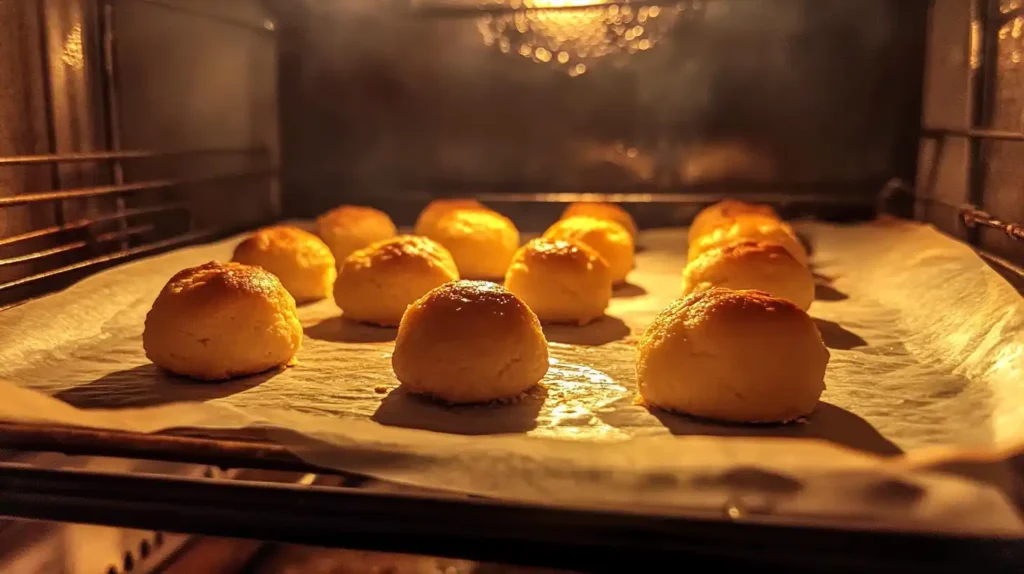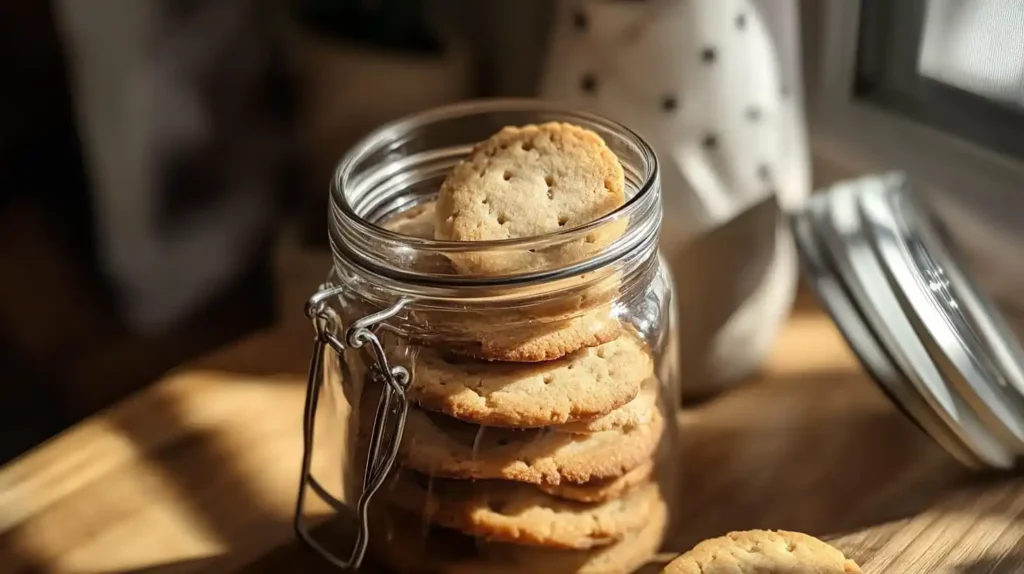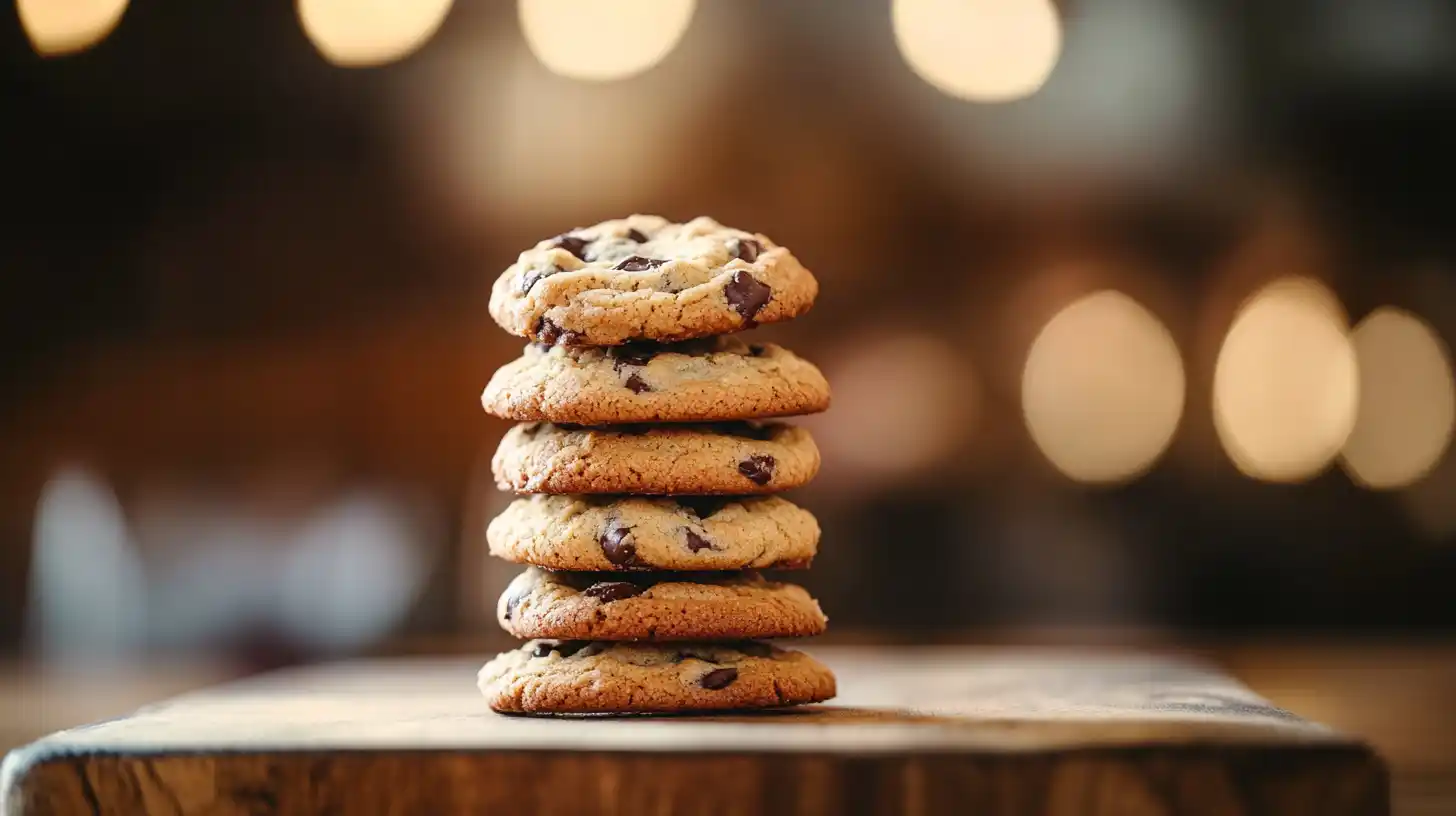What is the trick to making soft and chewy cookies? Many home bakers struggle to achieve that perfect soft texture, often ending up with dry or overly crisp cookies. If you’re wondering what is the trick to making soft and chewy cookies, the answer lies in choosing the right ingredients, proper mixing, and smart baking techniques.
Thankfully, achieving that perfect chewiness isn’t complicated. By making a few simple adjustments, you’ll learn what is the trick to making soft and chewy cookies and never bake hard, dry cookies again!

The Science Behind Soft and Chewy Cookies
If you want to bake chewy cookies, you first need to understand what makes them soft.
Why Do Some Cookies Stay Soft While Others Turn Hard?
The difference between soft, chewy cookies and dry, hard ones comes down to three key factors:
- Moisture – Cookies need enough moisture to stay soft. Ingredients like brown sugar, eggs, and butter help retain moisture.
- Flour & Gluten – Too much flour or overmixing the dough makes cookies tough. Less gluten means a softer texture.
- Baking Time & Temperature – Baking for too long or at high temperatures removes moisture, making cookies crispy.
Choosing the Right Ingredients for Soft and Chewy Cookies
If you want to know what is the trick to making soft and chewy cookies, ingredient selection is key. Here’s how to choose the best ingredients for the perfect texture.
1. The Best Flour for Soft Cookies
The type of flour you use has a big impact on your cookies.
- All-purpose flour is the best choice for a balance of softness and chewiness.
- Cake flour makes cookies extra soft, but they may be more cake-like than chewy.
- Bread flour has more protein, which can make cookies chewier.
➡ Tip: Always use fresh flour! If your flour is old, your cookies may turn out dry or dense.
2. Sugar: The Secret to Soft and Chewy Cookies
Sugar does more than add sweetness it also affects texture.
- Brown sugar makes cookies softer and chewier because it contains more moisture.
- White sugar helps cookies spread more and makes them slightly crispier.
- If you want extra soft cookies, use more brown sugar than white sugar in your recipe.
➡ Tip: If you love extra chewy cookies, try using dark brown sugar for even more moisture!
3. Butter vs. Shortening: Which One is Better?
The type of fat in your cookies changes their texture and flavor.
- Butter adds a rich, delicious flavor but can cause cookies to spread more.
- Shortening keeps cookies soft and thick but has a milder taste.
- The best trick? Use half butter and half shortening for the perfect balance of chewiness and flavor.
➡ Tip: Always use room temperature butter to mix properly with sugar and create a smooth dough.
Did you know that cottage cheese can keep your cakes moist and fluffy? Deepen your knowledge about why cottage cheese is a baking essential.
Moisture and Mixing: Essential for Soft Cookies
To truly understand what is the trick to making soft and chewy cookies, mastering moisture retention and mixing techniques is crucial.
4. Don’t Skip Egg Yolks for Extra Softness
Eggs are a key ingredient in cookie dough, but did you know that egg yolks help make cookies chewier?
- Egg yolks add fat, which keeps cookies moist and soft.
- Using extra egg yolks makes cookies richer and more tender.
- If a recipe calls for one whole egg, try adding an extra yolk for chewier cookies.
➡ Tip: If you want super soft cookies, try using only egg yolks instead of whole eggs.
5. Add a Secret Moisture Booster
Sometimes, adding just one extra ingredient can make your cookies stay soft longer. Here are some great options:
- Corn syrup – Helps cookies stay chewy for days.
- Honey or molasses – Adds both moisture and flavor.
- Sour cream or Greek yogurt – Makes cookies extra soft and rich.
➡ Tip: Add one tablespoon of honey or molasses to your dough for longer-lasting chewiness.
If you love experimenting with alternative baking methods, you might be interested in how cottage cheese is used in baking. Learn more in this guide to baking with cottage cheese.
6. Chilling the Dough Improves Texture
Do you ever wonder why bakery cookies taste chewier and better than homemade ones? One secret is chilling the dough before baking!
- Chilling the dough gives the flour time to absorb moisture, making cookies chewier.
- It also prevents cookies from spreading too much, keeping them thicker and softer.
- For the best results, refrigerate the dough for at least 30 minutes (or even overnight).
➡ Tip: If you want cookies right away, shape the dough into balls and freeze them for 15 minutes before baking.
If you want your cookies to stay soft and chewy for days, discover the secret ingredient to keep cookies soft.
Baking Techniques for Soft and Chewy Cookies
Now that we have prepared the perfect cookie dough, it’s time to bake! However, even the best dough can turn into hard, dry cookies if not baked correctly. Let’s go over the best baking techniques to keep your cookies soft, thick, and chewy.

7. Bake at the Right Temperature for Soft Cookies
The oven temperature affects how cookies bake. If it’s too high, they will spread too much and turn crispy. If it’s too low, they may not cook properly.
- The best baking temperature for soft and chewy cookies is 325°F – 350°F (160°C – 175°C).
- Lower temperatures slow down moisture loss, keeping cookies soft.
- Baking at higher temperatures makes cookies crispier because they cook too fast.
➡ Tip: If you love thick, chewy cookies, bake at 325°F (160°C) for a longer time.
8. Underbaking is the Secret to Soft Cookies
One of the best tricks for keeping cookies soft is to take them out of the oven before they look fully baked.
- Remove cookies when the edges are set, but the center still looks slightly undercooked.
- As cookies cool, they continue to firm up on the baking sheet, which keeps the inside soft.
- If you bake them until they look done, they will turn hard and dry when they cool.
➡ Tip: For extra soft cookies, take them out 1-2 minutes early and let them finish baking on the tray.
9. Cooling Cookies the Right Way
The way cookies cool affects their final texture. If they cool too fast, they will lose too much moisture and turn hard.
- Let the cookies cool on the baking sheet for 5 minutes before moving them.
- Then, place them on a wire rack to cool completely.
- Never leave cookies on the baking sheet for too long, or they will become dry.
➡ Tip: If you want to keep cookies extra soft, cover them with a clean towel while they cool.
Expert Tricks for Extra Chewy Cookies
Now that you know the basics, let’s take your soft and chewy cookies to the next level! These expert baking tricks will help you achieve a texture that is even softer, thicker, and chewier.
10. Cornstarch is the Secret Ingredient for Soft Cookies
Many professional bakers add cornstarch to their cookie dough for a super soft texture.
- Cornstarch prevents cookies from becoming tough by reducing gluten formation.
- It makes cookies thicker and softer without changing the flavor.
- Just add 1–2 teaspoons of cornstarch per cup of flour for the best results.
➡ Tip: If you love thick, bakery-style cookies, cornstarch is a must-try ingredient!
11. Use Melted Butter for Extra Chewiness
Instead of using softened butter, try using melted butter to create a chewier texture.
- Melted butter hydrates the flour more, leading to a denser and chewier cookie.
- However, using melted butter can cause cookies to spread too much.
- To prevent this, make sure to chill the dough before baking.
➡ Tip: If you want chewy cookies with crisp edges, use melted butter and refrigerate the dough for at least 30 minutes.
12. Add a High-Fat Dairy Ingredient for More Moisture
For extra soft cookies, try adding a high-fat dairy ingredient. This helps retain moisture, making cookies softer for days.
- Whole milk – Adds extra richness to cookie dough.
- Greek yogurt or sour cream – Keeps cookies moist and soft longer.
- Heavy cream – Creates a richer, softer texture.
➡ Tip: Replace 1 tablespoon of butter with 1 tablespoon of sour cream or yogurt for super soft cookies.
13. Resting Cookie Dough Makes a Big Difference
Did you know that resting cookie dough enhances both flavor and texture?
- When cookie dough rests in the fridge, the flour absorbs moisture, which improves chewiness.
- It also reduces spreading, making cookies thicker and softer.
- For the best results, chill cookie dough for at least 30 minutes (or overnight for deeper flavor).
➡ Tip: If you’re short on time, freeze cookie dough for 15 minutes instead of refrigerating overnight.
Common Mistakes That Lead to Hard Cookies
Even if you follow the best recipes, small mistakes can ruin your soft and chewy cookies. If your cookies turn out too hard, dry, or crumbly, you might be making one of these common baking mistakes. Let’s go over what to avoid so your cookies stay soft and delicious.
14. Overbaking: The #1 Mistake That Makes Cookies Hard
Many bakers think cookies should look fully baked when they come out of the oven. However, this is a big mistake!
- Cookies keep baking on the hot tray even after you remove them from the oven.
- If they look fully cooked when you take them out, they will turn hard after cooling.
- Instead, remove cookies when the edges are set, but the center still looks soft.
➡ Tip: For soft cookies, take them out 1-2 minutes earlier than you think!
15. Measuring Flour Incorrectly
Adding too much flour soaks up moisture, making cookies dense and dry. Many bakers accidentally add too much flour because they measure it incorrectly.
- Never scoop flour directly from the bag. This packs the flour and adds too much to your dough.
- Instead, use the spoon-and-level method:
- Lightly spoon flour into a measuring cup.
- Then, level it off with a knife.
➡ Tip: For accurate measurements, use a kitchen scale to weigh flour instead of using measuring cups.
16. Skipping Brown Sugar
If you want soft, chewy cookies, you need brown sugar. Skipping it reduces moisture, making cookies drier and crispier.
- Brown sugar contains molasses, which keeps cookies moist and chewy.
- White sugar makes cookies crispier but doesn’t hold moisture as well.
- The best trick? Use more brown sugar than white sugar for extra chewiness!
➡ Tip: If you don’t have brown sugar, add 1 tablespoon of molasses per cup of white sugar as a substitute.
17. Overmixing the Dough
Mixing too much develops too much gluten, making cookies tough instead of soft.
- Overmixing happens when you mix the dough too long after adding the flour.
- To avoid this, mix only until the flour disappears—don’t overwork the dough!
➡ Tip: If you want light and chewy cookies, mix the dough gently and stop as soon as everything is combined.
18. Cooling Cookies the Wrong Way
Cooling cookies incorrectly can also make them hard.
- If you leave cookies on the hot baking sheet too long, they will keep baking and turn hard.
- However, if you move them too soon, they can break.
- The best method? Let them cool on the baking sheet for 5 minutes, then transfer to a wire rack.
➡ Tip: Cover cookies with a clean towel while they cool to keep them soft.
How to Store Cookies to Keep Them Soft

Even the softest cookies can become stale over time. Follow these tips to keep them fresh:
- Store cookies in an airtight container to prevent moisture loss.
- Place a slice of bread or a marshmallow in the container. This helps maintain softness.
- If cookies start to harden, microwave them for 5-10 seconds to restore warmth and chewiness.
Frequently Asked Questions
Why do my cookies turn hard after cooling?
Cookies lose moisture as they cool. To prevent this, store them in an airtight container with a slice of bread.
How can I make my cookies softer after baking?
To soften cookies, microwave them for a few seconds or place them in a sealed container with a damp paper towel.
Does chilling cookie dough really make a difference?
Yes! Chilling enhances flavor development while also preventing excess spreading.
Why did my cookies turn out dry?
Overbaking or using too much flour are common causes. Be sure to measure ingredients properly.
Can I make cookies soft without brown sugar?
Yes! Substitute brown sugar with honey or molasses for a similar moisture effect.
Final Thoughts
Mastering the trick to making soft and chewy cookies requires a mix of quality ingredients, proper mixing, and careful baking techniques. By using brown sugar, adding cornstarch, chilling the dough, and slightly underbaking, you can create bakery-quality cookies at home.
Now that you know the best techniques, why not try them today? Your perfect soft and chewy cookies are just a few steps away! 🍪😊

